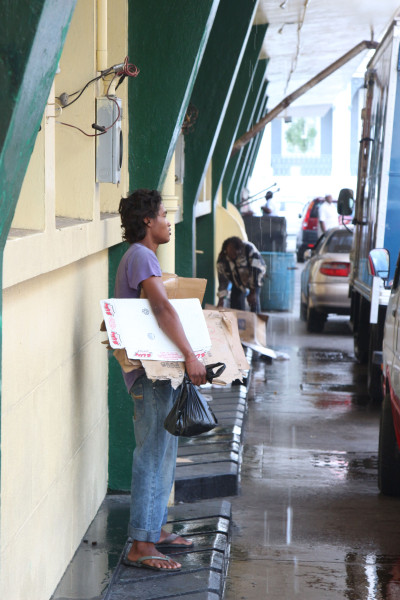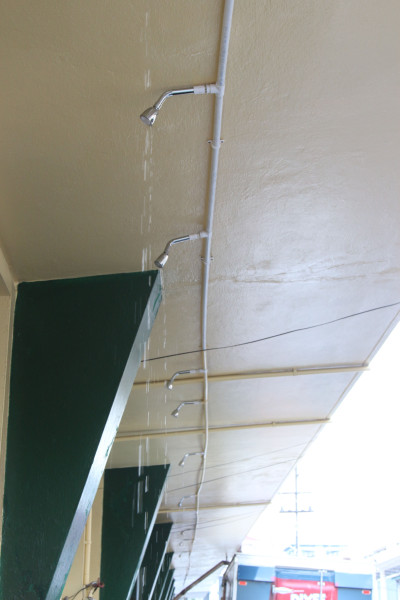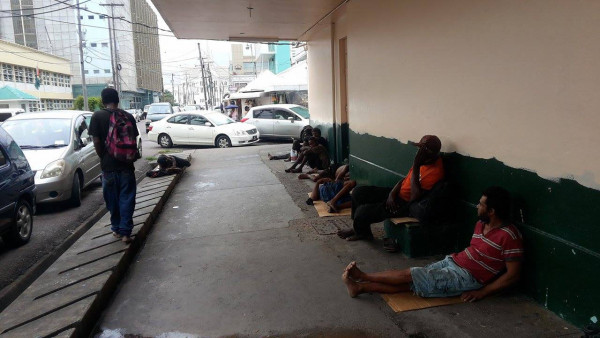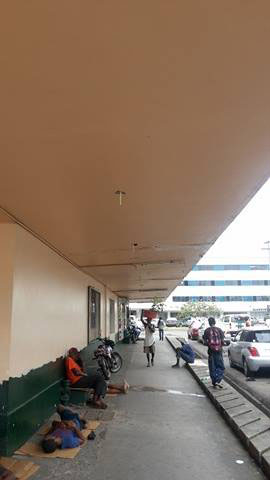“Think of this: You in a deep sleep, curl up, dreaming all kinda story and then ‘bloosh,’ water splashing like mad on you. Is dem thing these people deh pon everyday iya,” a homeless man, who asks to be called only ‘Dougla,’ says.
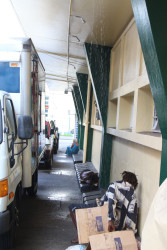
He is one of the homeless persons who have removed from the downtown pavements surrounding the Guyana Post Office Corporation (GPOC), the Fogarty’s Department Store and the Hand-in-Hand Insurance Company, where water is being rained down on them by sprinkler systems.
“I moved because dem is mek you feel like you ain’t get feelings, like you ain’t human. Honest. They treat you like animal and I don’t even think animals, ’cause you is protect yuh animals nah? Out here is nuff, nuff stress and I can’t deal wid duh because nobody never even come to ask we a day yet why we living out here,” he says.
During a visit to the Robbstown area early yesterday morning, Stabroek News observed the overhead sprinklers, which are activated internally and deliver watery wake-up calls on a daily basis to the many homeless persons who sleep in their vicinity.
GPOC says it is one of their security measures to ensure the vagrants do not return, especially during busy working hours, while Forgarty’s said it is intended to clean the pavement area of the rancid odour caused by the pavement dwellers.
Stabroek News contacted the Hand-in-Hand Insurance Company but was told that the person who was authorised to speak on why the sprinkler system was installed, Winston George, was not available but would return a call. Up to press time, George had not called.
Humiliation
None of the vagrants wanted to give their whole names and some were fearful that they were being interviewed by the police. Even the very vocal Dougla did not want his face to be photographed as he believed that people “all over the world” would see him on the internet and TV and “judge” him for the life he has chosen.
He spoke for most of the vagrants, who would nudge him to remind him whenever he forgot to mention anything. He told of the daily humiliation he once endured before finding another location to sleep.
“You can get a lil sleep in the night because like deh can’t programme it and lef’ it but that’s the ites you gat to wake up to. Early in mornings, like whoever come fuss to wuk is gah turn on de pipe dem fuh wet we up,” he said as the others agreed.
“But hear nah, we get a lil system we is run. We is gah tek turn to look out fuh de peeper cause when deh come in to wuk, some good crosses is come fuh peep to see if we deh hay… we is call dem ‘de peeper’ and when we lookout man see de peeper, he is shout out ‘peeper’ and we is get up quick and beat out and mek we ites… everybody with deh cardboard running fuh cover,” he added.
He said because of the humiliation, he decided to move from sleeping in the area but would return to collect meals from a Chinese man, who brings them food and bottled water daily.
“When we own Guyanese people make we feel like s#!t, deh gat a Chinese man is come every religious day and give we a big box a food with loud fry fish pon top and a bottle of sealed water, not pipe water or dutty water, so listen good, is dem new $100 bottle. Every man jack get he big box and he water and he feeling important, bless up and thing,” a smiling Dougla informed.
The others also lauded the humanitarian efforts of the unknown man.
But while Dougla has found another place to rest his head, others remain.
Dougla pointed to an elderly man, whom they all call “Big Man.” No one knows his name because no one asked and now he cannot answer since he had a stroke over a year ago and his speech is inaudible.
He said the man has a family somewhere but has been abandoned and needs care since the stroke has rendered him paralysed on his left side. “Big Man is get wet most time because he can’t move very fast like we so, because of the stroke. So, somebody is got to help he,” Dougla said as the elderly man kept nodding in agreement to most of what he said of him.
Another homeless man, Mohammed (only name given), said that he expected that they would be left to dwell on the pavements since they clean the environs and sometimes even help in the washing it with the waters from the sprinklers above.
Security feature
The GPOC maintains that the sprinkler system was its only alternative since the pavement dwellers would not move on verbal command or would sometimes become very violent towards the staffers trying to move them.
“So the sprinkler system, that is a mechanism to maintain control on that area, to ensure that vagrants do not take over… it’s a security feature for us and also ensures the enhancing of the environment… That is an area we have a lot of our operations, transactions, whatever, it is a very busy area for us we are looking at security-wise as well, because we are looking at valuables coming in, valuables going out, so we need a secure area there. In the past, we have had issues with controlling the vagrants out there. Sometimes we ask them to leave and they get violent and so on,” GPOC Public Relations Officer Telesha Whyte told Stabroek News.
“Sometimes, it becomes very smelly. They do their bowel works there and it is supposed to be a secure area… it is not an automatic system, so it is not a case where persons are going to pass and the sprinkler is going to come on and wet them, it is not automatic,” she added, while noting that manual checks are also made before the system is turned on to ensure that water is not wasted.
However, Whyte said that GPOC is willing to partner with a social organisation wanting to assist with the dwellers, most of whom, she believes, suffer from mental health problems.
Fogarty’s spokesperson Sabrina Jeffrey said the overhead pipes were installed to wash the pavement around the building. “It is to ensure the pavement is clean. It is a cleaning process because we have the cafeteria right there and the smell from the vagrants sometimes comes in. It is done, most times, in the morning part. We have two persons clearing the pavement and they stand at the two ends and tell persons that we are going to wash the area so no one from the public is wet,” she said. According to Jeffrey, on notice the vagrants usually comply to move.
However, the vagrants say that they are seldom warned. Some hoped that authorities would help with the provision of a home but noted that they also need rehabilitation facilities for those who have drug addictions and others who are suffering from mental illnesses.
“They can give we a house yeah but you gat to also look at why some a’ we is junkie or run off and deal with duh. They got to put we in a home but make sure when we coming back on the road we don’t come back here or find another place to put we cardboard,” drug addict Orson said.
While Dougla admitted that he was a substance abuser, he explained that he first moved to the area because he had run away from the home of his aunt after he and his sister went to live there and the conditions became unbearable. Once on the streets, however, another pavement dweller introduced him to marijuana then cocaine and he has since become addicted. “Not a boy ask me how I get like this. My life now is I get it suh, ’cause I turn wayward and thing but de presha didn’t ordinary, you know. I lived with my aunty and like I was a slave, a gah do everything—wash wares, clothes, pick up clothes and fold, cook food, everything. When I used to live with my mother, I used to just gah clean the yard real spickle and me sister used to help she out with other wuk. Plus, you can’t watch she TV, only wuh she watching and you can’t play lil music, you can’t talk to a girl, nothing,” he said.
It is unclear whether the Ministry of Social Protection has been in contact with these persons.
